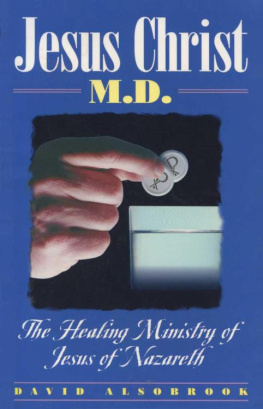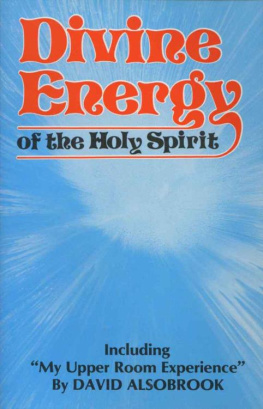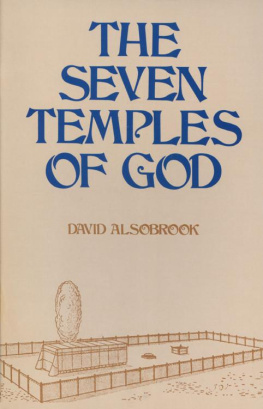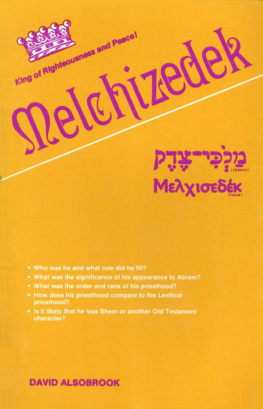Jesus Christ, M.D.
The Healing Ministry
of
Jesus of Nazareth
David Alsobrook
Contents
Ginny,
Your love brings joy to my heart.
And Jesus was going about in all Galilee, teaching in their synagogues, and proclaiming the gospel of the kingdom, and healing every kind of disease and every kind of sickness among the people.
Matthew 4:23
Foreword
For many years I have been asked to write an extensive book on the biblical doctrine of divine healing. Jesus Christ, m.d . is not such a book. It is not even an exhaustive study on the earthly healing ministry of Jesus of Nazareth as far as the individual accounts of healing contained in the Gospels are concerned. Rather, this book is a study of the underlying principles of His unique healing ministry and in that respect it is valuable and needed.
There is so much about healing which is not found in this small work. The Healing Covenant with Israel is not mentioned, nor is the Passover Miracle of Healing discussed. The healing ministry of the Early Church is barely mentioned as is the great provision of healing Jesus provided for His people in His passion and atonement. We intend to write on these needed aspects of healing as soon as time permits. We have also omitted many wonderful testimonies of healing which have occurred in our day and have chosen to limit our focus to the 3 1/2 years that He labored among the lost sheep of the house of Israel.
Where this book shines is in the example Jesus set in healing the sick and the principles underlying His healing ministry. All who desire to be extensions of His ongoing healing ministry can avail themselves of much needed insight from these pages. All those who need healing will find it much easier to receive after reading this small volume.
May the Healer bless each reader throughout these pages is my prayer.
David Alsobrook
Nashville, Tennessee September, 1999
1. The Significance of Healing
Every miracle of divine healing which has ever occurred has been a miracle performed through the agency of Jesus Christ including those performed by Moses, Elijah, Elisha, and others who lived before the Incarnation. This is so because all spiritual blessings come through Him including the first miracles of Creation (see Ephesians 1:3; Cl 1:16). The scope of this book, however, is strictly focused upon the 3 1/2 years of His earthly ministry.
What is the value of focusing on the earthly healing ministry of Jesus of Nazareth? There are several benefits:
1. His miracles reveal aspects of His divine nature. The deity of Christ shines forth in the Gospel accounts. We grow in our understanding of Him through studying His miracles.
This beginning of His signs Jesus did in Cana of Galilee, and manifested His glory, and His disciples believed in Him.
John 2:11
Many other signs therefore Jesus also performed in the presence of the disciples, which are not written in this book; but these have been written that you may believe that Jesus is the Christ, the Son of God; and that believing you may have life in His name.
John 20:30-31
This is not to say that Jesus performed miracles only to prove His deity, but His miracles can and do display His deity to those who have eyes to see.
2. Christ performed miracles through His reliance upon the Holy Spirit rather than upon His inherent deity, thus providing an example for us to follow.
Truly, truly, I say to you, he who believes in Me, the works that I do shall he do also; and greater works than these shall he do; because I go to the Father...And I will ask the Father, and He will give you another Helper, that He may be with you forever; that is the Spirit of truth, whom the world cannot receive...
John 14:12 ,17
If Jesus had performed miracles based upon His inherent deity, believers today could not perform them, since while it is true that they share in His divine nature, it is also true that they are not now, nor will they ever be divine (2 Peter 1:4).
In the great Kenotic Hymn of Philippians 2:5-11, Paul makes it clear that Jesus did not rely upon His qualities as God when He emptied Himself and laid aside His divine rights and privileges in the Incarnation.
He lived among men as a man, being man of very man, as an example for all men to follow. He remained God of very God as touching His deity throughout His earthly life, and even though He functioned as man His deity constantly shined through his perfect human lifenot just when He was transfigured or walked on waterbut throughout all His actions and speech. This is what theologians have termed the hypostatic union of the two natures in the person of Christ. He was God and He was man, not a centaurian mixture of half God and half man. Yet He did not perform miracles during the earthly ministry by reason of His deity, but as a man fully yielded to another Person, the Third Person of the Godhead, the Holy Spirit.
Christ gave us an example to follow, Peter says, which includes healing others (see 1 Peter 2:21-25 and consider the entire passage as one continuous thought).
As He commenced His earthly ministry Jesus announced in His home church (the synagogue) that He was the long awaited Messiah (the special Sent One smeared with the Holy Anointing Oil of the Spirit):
And He came to Nazareth, where He had been brought up; and as was His custom, He entered the synagogue on the Sabbath, and stood up to read. And the book of the prophet Isaiah was handed to Him. And He opened the book, and found the place where it was written,














